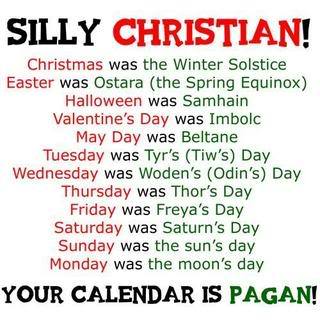Gallery
Photos from events, contest for the best costume, videos from master classes.
 |  |
 |  |
 |  |
 |  |
 |  |
 |  |
Valentine's Day as a Commercial Holiday . Valentine's Day is no longer part of the official liturgical calendar of any Christian church; it was dropped from the Catholic calendar in 1969. Its not a feast, a celebration, or a memorial of any martyrs. Lupercalia was an ancient pagan festival held each year in Rome on February 15. Although Valentine’s Day shares its name with a martyred Christian saint, some historians believe the holiday is So, let’s dive in and unwrap the layers of this fascinating holiday. The Pagan Origin of Valentine’s Day Historical Crossroads: Valentine’s Day and Lupercalia. While Valentine’s Day is widely recognized as a celebration of love in modern times, its historical roots are far more intricate and, believe it or not, a bit wilder. Every year on February 14, the world marks Valentine’s Day.Millions send messages and gifts of love to the people most important in their lives. You’d be forgiven for thinking the fourteenth has its roots in the Christian faith, with the day seemingly named after Saint Valentine, a priest who lived during the third century AD. The holiday’s origins likely predate the venerated saint. The date of St. Valentine’s execution, the day after the February full moon, might be the real connection with affection. As fans of Shakespeare know, the Idus or “Ides” of each month on the ancient Roman calendar was the day of the full moon. The theme of love running free and wild is another facet of this wonderful holiday-and deity: our own, inner wilderness being allowed to roam free. Valentine’s Day is the Modern equivalent of Lupercalia, even though much of the symbolism of the former has been lost over time, subsumed into the latter’s imagery of hearts, red, white and pink. It’s often speculated that Valentine’s Day has its roots in the ancient Roman festival of Lupercalia, and it’s not hard to see why. Lupercalia was observed on February 15, and involved fertility rituals — albeit along with animal sacrifice and ritual whipping. Yet the link between this pagan festival and the Christian feast day that morphed into our modern ode to love and romance is In the late 5th century, Pope Gelasius I outlawed Lupercalia. Some contend that he designated the celebration of St. Valentine's Day on February 14 to replace the pagan holiday. When did Valentine's Day become a romantic holiday? The festival of Valentine's Day may have evolved from a Roman love lottery, held around the time of the Lupercalia. The holiday got an overhaul as Christianity took hold, and was renamed for Saint Valentine. Valentine's Day Origins: From Pagan Rituals to Christian Feast. Long before Valentine’s Day became a symbol of romantic love, there was the Roman festival of Lupercalia. This pagan celebration, observed from February 13 to 15, involved the sacrifice of a goat and a dog, followed by a ritual in which young men, clad in the sacrificed animals Valentine's Day is a time to celebrate romance and love and kissy-face fealty. But the origins of this festival of candy and cupids are actually dark, bloody — and a bit muddled. Valentine's Day has pagan origins Lupercalia holiday was a wild fest Emotional needs drive our rituals Psychological insights fuel connection True intimacy requires understanding Valentine's Day glimmers in shades of pink and red. Roses, chocolates, and candlelit dinners abound. Valentine’s Day is a holiday celebrated every February 14; this year Valentine's Day falls on a Friday. Across the United States and in other places around the world, candy, flowers and gifts In this article, we will explore the origins, history, and traditions of Valentine’s Day, shedding light on how this beloved holiday evolved. The Pagan Roots of Valentine’s Day: The Festival of Lupercalia. The Valentine’s Day origin can be traced back to ancient Roman celebrations, specifically the Festival of Lupercalia. The origins of Valentine's Day remain shrouded in mystery, though some theories have grown to be widely accepted, including its connection to a pagan holiday. Eric Lagatta USA TODAY On Valentine's Day, millions present flowers, chocolates and cards to their sweethearts.While the holiday's traditions really became cemented in the 1800s, historians link its roots to wild pagan This year, the holiday is on a Friday, which gives couples a chance for a getaway weekend. Here's a look back at the history of Valentine's Day: Valentine's Day pagan connections. The Telegraph, History of Valentine’s Day, February 14, 2010 8. The Decline and Fall of the Roman Empire, Edward Gibbons, Chapter 36 9. American Catholic, The Origins of St. Valentine’s Day 10. Valentine Day Gift Ideas, Cassandrea Visik, Clinton Gilkie 11. Why do we celebrate Valentine's Day today? Valentine's Day's transformation into a holiday about romantic love can be attributed to the Romantic English poet Geoffrey Chaucer. The Times notes that Jack B. Oruch, a late University of Kansas English professor, credits Chaucer for modern ideas about Valentine's Day. Through his research, Oruch
Articles and news, personal stories, interviews with experts.
Photos from events, contest for the best costume, videos from master classes.
 |  |
 |  |
 |  |
 |  |
 |  |
 |  |